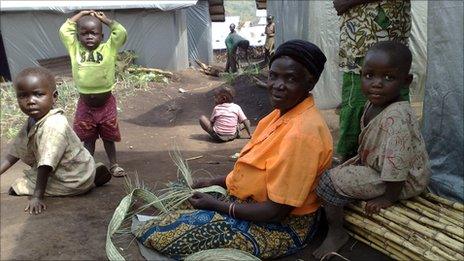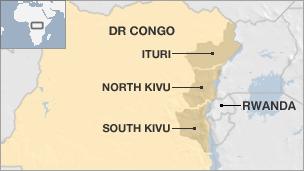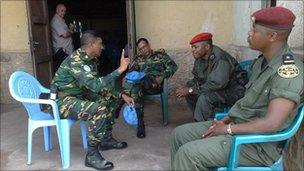Will trials bring peace to DR Congo's Ituri region?
- Published

Sofina Anyasi did not have time to grab anything when she fled her home
Sofina Anyasi is sitting in a camp for people forced from their homes in the Democratic Republic of Congo's Ituri district, weaving ribbons out of long blades of grass.
This elderly woman took refuge here last year, in a tarpaulin cabin between the army base and the United Nations peacekeepers' camp.
Ituri saw some of the most intense violence in DR Congo's successive wars, prompting the European Union and then the United Nations to send peacekeeping troops.
Four alleged warlords from Ituri are currently facing trial but despite the valid claims by government and international forces that they have defeated the bulk of Ituri's militias, small groups of gunmen continue to kill and loot in the south of the district.
War crimes
The International Criminal Court (ICC) is holding daily hearings into the trials of three suspected Ituri warlords, external, after DR Congo sent four prisoners to testify as witnesses in the Hague in March.
The ICC has been trying Thomas Lubanga for the war crime of child soldier conscription.
In another case, Germain Katanga and Mathieu Ngudjolo are charged with the same offence, as well as crimes against humanity of mass murder, rape and sexual enslavement.
Meanwhile, on 25 March, another trial opened before a military court in Kinshasa.
Gen Jerome Kakwavu, a militia leader who was integrated into the government army as part of a peace deal in 2004, is facing accusations of rape.
Yet another former rebel leader from Ituri, Bosco Ntaganda, is still a general in the Congolese armed forces despite an ICC warrant for his arrest.
'Strong signals'
Theodore Mukendi, a lawyer representing the victims for the non-governmental organisation Lawyers Without Borders, said the prospect of Gen Kakwavu's trial had encouraged more victims to come forward.
He also worked on the trial of Bernard Kakado last year, which he said was the first one in which a militia leader was jailed for crimes committed in Ituri.
"The opening of this new trial and the ones that are continuing at the International Criminal Court are strong signals that those who have been involved in atrocities in Ituri can expect to be held accountable before their victims and the judiciary," Mr Mukendi said.

Yet the southern part of the district is still not at peace.
Ms Anyasi says that she fled fighting and looting by the militiamen that still roam the hills around Bukiringi.
"I did not even have the time to take food or clothes with me."
Her village remains under threat from attacks by remaining members of the FRPI militia (Forces for Patriotic Resistance in Ituri) - the group formed by Mr Kakado and allegedly led by Gen Katanga.
The FRPI was one of the players in the ethnic conflict that flared up here 10 years ago.
Tens of thousands were killed, many by child soldiers or in cannibalistic rituals.
In June 2003, a French-led European offensive stopped the massacres.
After three months, EU peacekeepers left and gave way to UN and national efforts to disarm the rest of Ituri's rebel groups, which continue to this day.
'Groups of bandits'
"The militia is no longer organised in a military way," said Col Fall Sikabwe, the Congolese army commander for operations in Ituri.
"We have been carrying out numerous combat operations and totally destabilised that insurgent organisation. They now operate as small groups of bandits."
Violence is still simmering in the Ituri region following years of ethnic divisions
During a recent visit to Ituri, the UN's deputy representative in DRC, Fidele Sarassoro, said that the rebels' "operational capacity is virtually wiped out".
Yet he admitted that the bands of remaining guerrillas "still represent a large threat to the population".
"We are continuing joint operations with the Congolese army to finish off those groups," he said.
But UN and Congolese forces alike are stretched over a vast territory and face competing demands from more active flashpoints, such as the Kivu region further south.
When they clear an area of guerrillas, the police do not have enough resources to move in and maintain order.
On 20 April, gunmen killed two government soldiers in Aveba, just 40km (25 miles) from Bukiringi.
According to the UN's humanitarian coordination office, the number of rebel attacks against civilians in southern Ituri has been on the increase since February.
Grim limbo
Avezi Abezo, another of the 3,000 displaced people in Bukiringi said: "We don't believe in the purpose of the militiamen."
"Whatever their objective is, we only see them arrive somewhere to wreck havoc and destroy whatever community facilities the population was benefiting from. Up until now, we don't know what their goal is."

UN and Congolese troops are working together against the militias
Some local sources mention gold mines, but Ituri's main deposits are further north, in areas free of rebel activity.
The area is caught in a grim limbo between war and peace.
"The donors that fund emergency relief are turning away from Ituri while those that fund development projects are not yet convinced of the necessity to move into Ituri because of the lack of stability in some areas and of generalised corruption in the region," said Severine Ramis of the aid agency Save the Children.
Aid workers here say that what Ituri needs is long-term partnerships between government and international agencies to restore education, agriculture and economic networks, as well as a robust strategy to tackle land disputes that often plunge stabilised areas into fresh waves of violence.
But they add that what Ituri has been getting is mostly short-term assistance projects - and unrealistic expectations from its vast oil and gold deposits.